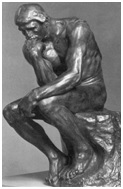|
 |
|
 |
|
|
||
Benedict (or Baruch) Spinoza - Philosophy, Ethics and
Happiness
Benedict (or Baruch) Spinoza (1632-77)
Dutch philosopher (pictured right) who:
Who did he influence? Albert Einstein, German-born American scientist.(pictured right) Sigmund Freud, Austrian psychiatrist (pictured right below). His most famous book is... Ethics (1677).
What did he say about ethics and happiness? 1. “God is nature” God is in everything (now called pantheism), “Whatever is, is in God”,Spinoza said. So we should respect and protect the world around us.
2. Mind and body Unlike René Descartes (pictured right), he said that your mind and body are inseparable and identical. So:
But Spinoza did believe in God’s ability to soothe the mind. Happiness, he said, is “Nothing but the contentment of mind that stems from the intuitive knowledge of God”. 3. You are not totally free Your decisions are caused, or determined, by prior events (now called determinism). Therefore, your life will be happier, if you understand and accept the
4. Reflect Think about:
Happiness and wisdom come from an active mind, continually doing something challenging, creative and worthwhile.
5. Control your life
a) conquer your desires Control them with self-discipline. b) be positive
c) rely on reason His support for reason and understanding to understand God and the universe led him to talk about the “intellectual love of God” (see point 6). 6. Reason with feeling All knowledge comes from reason (or intellectual analysis) and scientific progress, not superstition or ignorant dogmatism. You will be happiest, if you live by your true emotions and feelings (like love and integrity).
7. Put things into perspective Don’t dwell on your problems, which are never as big as they seem. They are insignificant in comparison with God and eternity. 8. Speak and listen He was a great supporter of free speech and expression. “Every man may think what he likes and say what he thinks”, he said. You should also be;
9. Learn to be wise “Learning for understanding” is the best activity, he said, because “to understand is to be free”. But life’s most valuable lessons are difficult to learn, and an idea isn’t necessarily true because it’s popular.
10. Equality is impossible We can’t all be equal because of our different levels of ability and effort. “He who seeks equality between unequals seeks an absurdity”, Spinoza said.
Key quote on influencing people Minds are not conquered by force, but by love and generosity.
Key quote on communication Every man should think what he likes and say what he thinks.
Key quote on society He who seeks equality between unequals seeks an absurdity.
Key quotes on freedom To understand is to be free. Men are deceived if they think themselves free.
Key quote on fear and anxiety Fear cannot be without hope nor hope without fear.
Key quote on politics and government The ultimate aim of government is... to free every man from fear.
Key quote on ethics A good thing which prevents us from enjoying a greater good is in truth an evil.
Key quote on God Whatever is, is in God.
Key quote on happiness Love for an object eternal and infinite feeds the mind with joy alone, a joy that is free from all sorrow.
|
|
|
||
|
|
||
| Copyright © wisdomtowin.com 2025 All Rights Reserved | ||
|













